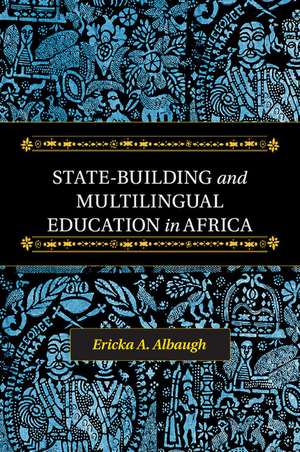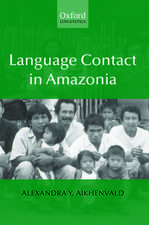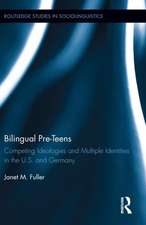State-Building and Multilingual Education in Africa
Autor Ericka A. Albaughen Limba Engleză Paperback – iul 2015
| Toate formatele și edițiile | Preț | Express |
|---|---|---|
| Paperback (1) | 289.57 lei 6-8 săpt. | |
| Cambridge University Press – iul 2015 | 289.57 lei 6-8 săpt. | |
| Hardback (1) | 724.49 lei 6-8 săpt. | |
| Cambridge University Press – 23 apr 2014 | 724.49 lei 6-8 săpt. |
Preț: 289.57 lei
Nou
Puncte Express: 434
Preț estimativ în valută:
55.42€ • 57.64$ • 45.75£
55.42€ • 57.64$ • 45.75£
Carte tipărită la comandă
Livrare economică 14-28 aprilie
Preluare comenzi: 021 569.72.76
Specificații
ISBN-13: 9781107696655
ISBN-10: 1107696658
Pagini: 336
Ilustrații: 23 b/w illus. 1 map 15 tables
Dimensiuni: 152 x 228 x 22 mm
Greutate: 0.49 kg
Editura: Cambridge University Press
Colecția Cambridge University Press
Locul publicării:New York, United States
ISBN-10: 1107696658
Pagini: 336
Ilustrații: 23 b/w illus. 1 map 15 tables
Dimensiuni: 152 x 228 x 22 mm
Greutate: 0.49 kg
Editura: Cambridge University Press
Colecția Cambridge University Press
Locul publicării:New York, United States
Cuprins
1. Introduction; 2. Language and education in Africa under mission and colonial influence; 3. Language choices in independent African states; 4. Opportunities for policy change: ideas, materials, and advocacy networks; 5. Incentives for policy change: ruler strategies for maintaining power; 6. Language, education, and 'democratization' in Cameroon; 7. Language and contention - violence and participation in contemporary African politics; 8. Conclusion; Appendix A; Appendix B.
Recenzii
'This is an extraordinary book in its originality, scope, detail, and thorough empirical dimensions. I have no doubt of its importance, as it uses language policy to make a broader statement about the nature and pitfalls of state construction in Africa.' Pierre Englebert, Pomona College
'This is a book that should be of strong theoretical and empirical interest to many scholars and practitioners from a wide number of disciplines. Ericka A. Albaugh explains the puzzling divergence of educational policy making … Albaugh has not only identified a very interesting empirical puzzle in terms of these changing educational policies over time in Africa, but she has also effectively located this variation in a broader theoretical context of state-building and democracy. Albaugh draws creatively on a collection of original and primary data sources to make an intriguing argument that multilingual policies do not have a straightforwardly positive or negative impact on democracy. Rather, analysts must distinguish between the varied short- versus long-term consequences of these policies in different political contexts.' Lauren M. MacLean, Indiana University
'Theoretically rich, well documented, and sophisticated in its argumentation, Albaugh's book is one of the finest available on the origins of public policy and the process of state-building in Africa.' Nicolas van de Walle, Foreign Affairs
'This is a book that should be of strong theoretical and empirical interest to many scholars and practitioners from a wide number of disciplines. Ericka A. Albaugh explains the puzzling divergence of educational policy making … Albaugh has not only identified a very interesting empirical puzzle in terms of these changing educational policies over time in Africa, but she has also effectively located this variation in a broader theoretical context of state-building and democracy. Albaugh draws creatively on a collection of original and primary data sources to make an intriguing argument that multilingual policies do not have a straightforwardly positive or negative impact on democracy. Rather, analysts must distinguish between the varied short- versus long-term consequences of these policies in different political contexts.' Lauren M. MacLean, Indiana University
'Theoretically rich, well documented, and sophisticated in its argumentation, Albaugh's book is one of the finest available on the origins of public policy and the process of state-building in Africa.' Nicolas van de Walle, Foreign Affairs
Notă biografică
Descriere
This book explains why many governments in Africa are including African languages alongside European languages as media of instruction in elementary schools.

















